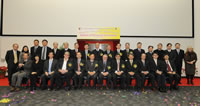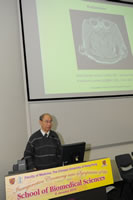|
|||||||||
8 January 2010 Inauguration Ceremony cum Symposium of CUHK School of Biomedical Sciences Held Today
Biomedical Sciences has been identified as one of the five focused areas of research in the University¡¦s Strategic Plan 2006. Guided by the vision of pursuing research excellence, the first School of Biomedical Sciences in Hong Kong was formed under CUHK Faculty of Medicine in June 2009 through the re-organization of four pre-clinical science departments, namely Departments of Anatomy, Biochemistry (Medicine), Pharmacology, and Physiology. ¡¥The establishment of the School aims to promote cutting-edge research through interdisciplinary collaboration among basic science investigators and clinicians, thus advancing translational research locally, regionally and internationally. We also aim to generate synergies in team teaching at both undergraduate and postgraduate levels, and to nurture the next generation of basic researchers and physician scientists in Hong Kong, China, Asia and around the world,¡¦ said Professor Chan Wai-yee, the School Director. The School has adopted a research theme-based approach as its new operational model. Specifically, the following five thematic research programmes (TRPs) have been established: Investigators in these TRPs are supported by the School¡¦s core facilities, namely the Macromolecular and Microarray Core, Flow Cytometry and Cell Culture Core, Microscopy and Imaging Core, and Histology Core. These facilities serve as an extension of the investigators¡¦ laboratories and augment their research by providing specialized state-of-the-art equipment and on-site training or help from experienced technical staff. To encourage interdisciplinary research collaborations, investigators in the Faculty of Medicine with relevant research background are invited to join the TRPs as associate members. Through the regrouping of investigators with similar scientific interests and complementary expertise, and the ongoing recruitment of new faculty, it is believed that a critical mass will be formed to undertake ambitious research projects of local, regional and global impact, and make substantial advances and contributions to biomedical sciences. It is also the School¡¦s hope to facilitate the translation of basic research to clinical applications. While striving for research excellence, the School also recognizes the value of training high-caliber research postgraduate and undergraduate students and is committed to quality teaching and learning. At the postgraduate level, the Graduate Division of Biomedical Sciences has been established since August 2009. To strengthen basic training and to enhance in-depth research of the highest standard, the Articulated MPhil-PhD Programme will be launched in 2010/2011 under which flexible study modes and a range of theme-based research topics across different disciplines will be offered for selection by the admitted students according to their research interests. The Division has already established strong academic links with reputable research institutes both nationally and internationally so as to provide its postgraduate students with global perspectives. Examples of these links include the National Institutes of Health (NIH) Graduate Partnerships Program and the Collaborative Partnership in Training of Predoctoral Students with the School of Basic Medical Sciences, Zhejiang University. At the undergraduate level, the School offers medical and non-medical courses to different programmes available within or outside the Faculty of Medicine, including MBChB, Nursing, Pharmacy, Human Biology, Chinese Medicine and Food and Nutritional Sciences Programmes. In view of the implementation of the 334 curriculum in 2012 and the increasing emphasis on improving teaching and learning quality with the application of outcomes-based approach as advocated by the University Grants Committee, the Teaching and Learning Unit was established in October 2009. This Unit undertakes the missions of i) promoting the development and the use of teaching techniques and learning tools that advance teaching quality and facilitate student learning, ii) improving the quality of formative and summative assessments, and iii) conducting research in areas of teaching, learning and assessments for implementation in the School. ¡¥To cope with the anticipated expansion in research activities and provide support for the new scientific and developmental initiatives, the School will be relocated to Area 39, Northside Research Campus around mid 2012. It is hoped that the new infrastructure and the cohesive physical environment in the new building will help nurture a prolific team of dedicated researchers who would become well recognized global leaders in their specialized areas of expertise,¡¦ concluded the School Director.
|
|||||||||



